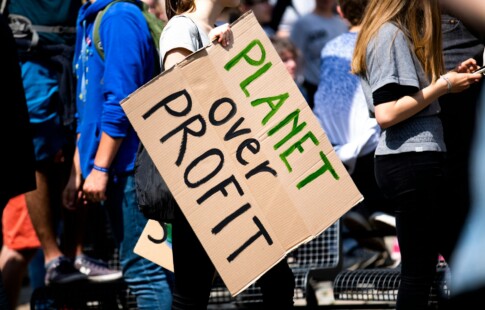
8 Companies Facing Environmental Issues in 2024
We are reader-supported. When you buy through links on our site, we may earn affiliate commission.
It is no secret that the global energy sector has the highest environmental impact. For every dollar an American corporation generates, 18.5 cents of it is environmental damage through greenhouse gas emissions.
The top 100 fossil fuel companies are responsible for 71% of industrial global greenhouse emissions. This statistic is widely misunderstood. The data focuses on fossil fuel and cement producers, and it doesn’t consider indirect emissions from corporations and individuals using these resources.
Knowing this, it is easy to imagine how many more emissions are produced by corporations that rely on fossil fuels, like the ones listed here. But the fossil fuel industry isn’t the only one damaging the environment. Other large corporations, such as Coca-Cola, Apple and Ikea, also have a detrimental effect on the environment.
In the past, companies across numerous industries — including manufacturing, food, fashion and electronics — have been wary of upholding transparency with how they mitigate their impact. We will look at seven companies facing environmental issues in 2020. The business identified encompass various industries, focusing on business to consumer models. In particular, we will spotlight companies that have a poor track record of environmental initiatives but are making a deliberate effort to be more sustainable.
1. Ikea
Ikea, a European furniture retail company, is taking a big step towards sustainability. However, it is still working to find more sustainable solutions to its aggressive consumption of natural resources. Ikea consumes more wood than any other company — 1% of the world’s wood. While the business is working to source sustainably, this can be a difficult transition in the short term.
Even though Ikea is a leader in the “fast furniture” industry, the progression of reducing impact requires modifications that can take years to establish. Ikea is making a step towards only sourcing from responsibly managed forests, but it still produces furniture that does not have a long life expectancy. On a positive note, the business recently announced that by 2030, 100% of its products will consist of recycled material.
As of 2023, Ikea reports 97.8% of its wood is FSC-certified, and 17% is recycled. This means it has a long way to go before it reaches its goal, but it’s possible.
2. Apple
Electronic devices, such as phones and laptops, have a major environmental impact. Their influence lies in their manufacturing, but more significantly, there is also the issue of mining for conflict minerals. The mining processes for aluminum, cobalt, silicon and tin output significant amounts of pollution. One response to this is promising to use 100% recycled cobalt by 2025.
Along with a few other large technology firms, Apple also faces accusations of utilizing child labor in its mining efforts, especially in the Democratic Republic of Congo. iPhone production isn’t the only problem. One of the biggest pollutants we deal with today is e-waste. In 2022, the world generated 136.6 billion pounds of e-waste, with only 22% properly recycled. With Apple being one of the leading tech providers, this burden does fall in part on its staff.
However, Apple is making a renowned effort to mitigate its environmental impact. It has continually reduced its carbon footprint each year since 2017. Apple fulfilled its 2019 promise of using 100% renewable energy in their offices and data centers.
According to Apple’s website, the new MacBooks consist of 100% recycled aluminum. Apple is also promoting the longevity of its devices, with an increase in AppleCare for repairing products.
3. Walmart
The American retail corporation has faced sharp accusations of greenwashing in their sustainability statistics. With an industry focused on providing cheap products, they struggle with improving their environmental impact in all sectors.
Walmart’s rankings as a supermarket are among the worst in the country. Additionally, the brand receives criticism for marketing products with a short life span, acquiring undeveloped land at a record pace and supporting anti-environment political candidates. But Walmart realizes its consumer base expects more transparency.
The biggest companies have the greatest responsibility and opportunity to effect change. Walmart’s new plan, Project Gigaton, is an ambitious target to reduce greenhouse gas emissions. The company managed to achieve its goals six years early, removing one billion metric tons of greenhouse gases from its supply chain.
What about promises to using and expanding renewable energy? As of 2024, Walmart has over 600 clean energy projects and wants to add one gigawatt of green power on-site, which could include solar and storage solutions by 2030. Their third major goal is reducing plastic waste by transitioning to a more circular economy and decreasing the amount of packaging they dispose of.
4. Adidas
Founded in Germany, Adidas is a multinational footwear and clothing company. It is the second-largest sportswear manufacturer after Nike. One of the most unsustainable materials in the fashion industry is polyester. The synthetic fiber has a profound negative impact on the environment, being one of the largest sources of microplastic pollution, requiring double the energy of cotton to produce and being water-intensive.
In 2019, over 50% of Adidas products consisted of polyester. However, Adidas wanted to rely on 100% recycled polyester by 2024. How did it do? They got super close and hit 96%, which is still admirable if progress continues.
This ambitious goal is transforming the brand’s reputation with consumers and encouraging other sportswear businesses to source more sustainably. One of Adidas’s most publicized initiatives is the Parley Ocean Plastic plan, which uses plastic waste from our oceans to create recycled shoes. In the last several years, Adidas has:
- Committed to cleaning 77,122,551 plastic bottles from beaches and shorelines.
- Launched the Know the Carbon Footprint product range for transparency.
- Made 18 million pairs of shoes with ocean plastic in 2021, 30 million in 2020, and 11 million in 2019.
- Plan to reduce carbon footprints by 15% for each product by 2025.
5. Microsoft
Data centers have an enormous environmental impact. Data centers account for 1% of global emissions, which may increase as they become more energy-intensive and widespread. For a corporation of its size, Microsoft has been making surprisingly considerate progress toward reducing its environmental impact.
In recent years, Microsoft has been very transparent about its carbon footprint, releasing a yearly statement on its current consumption and future goals. By investing in new technology, renewable energy and green policies, Microsoft plans on being carbon negative by 2030.
This goal is essential because of the sustainability standard it sets for the industry. With technology such as virtualization software, Microsoft aims to improve its products’ energy efficiency. They also intend to train their staff to starve off questions whether or not they have the workforce adequate informed enough to use novel sustainability tech.
6. Lipton
A British tea brand owned by the transnational consumer goods company Unilever is making a convincing stride toward reducing its carbon footprint. Unilever’s history as a major plastic polluter has led the company to make vague statements about its future sustainability targets.
However, the brand’s efforts to improve its tea sourcing is a hopeful sign. According to their website, Unilever is making adjustments to its supply chain to source more sustainably. This company has set goals to source only from Rainforest Alliance-certified farms, invest in sustainable agriculture and reduce water waste.
Lipton’s U.S. manufacturing plant, located in Suffolk, Virginia, is showings signs of successfully reducing their environmental impact and saving money. In addition to how tea is sourced and produced, Lipton is also decreasing their packaging waste, using 40% less packaging than in previous years and planted 1.3 million trees to fight deforestation. Additionally, their goals have inspired:
- Five companies are carbon neutral, out of eight.
- 98% of operations in Kenya use renewables.
- Produce zero waste to landfill.
7. Starbucks
Starbucks has mixed reviews when it comes to committing to the planet, but it is irrefutable that they have made steps and started necessary conversations about single-use waste in the coffee industry. So, what is Starbucks doing?
They use Fair Trade- and organic-certified coffee, ensuring their beans come from ethical outfits. They also have even more focuses to commit to by 2030:
- Expanding their plant-based menu
- Using reusable packaging and encouraging customers to bring their own
- Impact investing
- Improving waste management
- Optimizing for more efficient and responsible operations and delivery
8. LEGO
LEGO is known for its plastic toys, but it was only a matter of time before people started to recognize how harmful these building blocks were for the planet. Thankfully, people can enjoy building their creations guilt-free, because the company is working hard to reimagine these famous products with an eco-friendly lens.
First, the company is eliminating their thick, paper booklet instructions that come with each build and encouraging app downloads. This reduces paper and ink usage. Additionally, they are replacing the plastic block bags for paper to make them recyclable. Their boxes even have notes on them that as the company transitions to sustainable packaging, there may be a mix of plastic and paper in boxes.
What about the infamous bricks? LEGO aims to be sustainable circular by 2032, using recycled waste and generating none.
Additionally, the company encourages LEGO owners to re-home used LEGO with LEGO Replay.
Companies Facing Environmental Issues
If companies want to improve upon their sustainability, listening to consumer concerns and adopting practical methods will be their best bet. It’s important to assert many of these plans are robust and promising, but they are in-progress. This means not everyone will be successful, and shifts may occur in the future that alter climate-friendly perspectives on these corporations. However, preserving the environment will be a matter of choosing green practices that fit their business models and company missions.
This post was updated March 27, 2024, in order to provide more current information.
Share on
Like what you read? Join other Environment.co readers!
Get the latest updates on our planet by subscribing to the Environment.co newsletter!
About the author

Jane Marsh
Starting from an early age, Jane Marsh loved all animals and became a budding environmentalist. Now, Jane works as the Editor-in-Chief of Environment.co where she covers topics related to climate policy, renewable energy, the food industry, and more.





